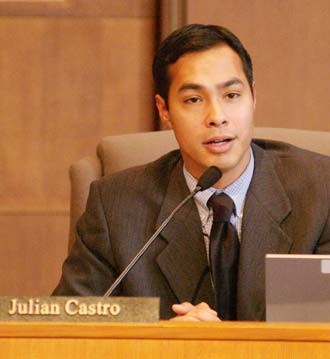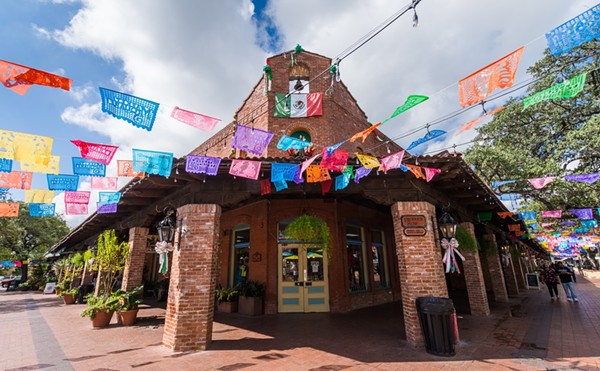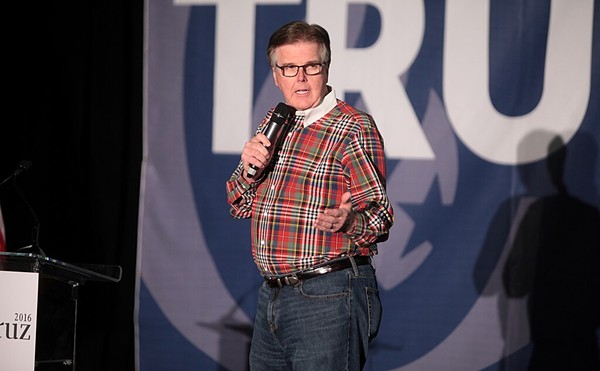INCOGNITO INCUMBENT FACES AGGRESSIVE CHALLENGER: District 6
DISTRICT 6 BY GILBERT GARCIA
Last summer, Brad Clear sent an e-mail to Mayor Ed Garza, looking for advice.
A State Farm claim specialist in his late 20s, with no political experience, Clear was considering a run for Enrique Barrera's District 6 council seat, and didn't know where to start.
For three weeks he heard nothing. Then he got a call from one of Garza's staffers, inviting him to a meeting at the mayor's office. At the meeting, he asked the question at the core of every political campaign in this country, from school-board rep to president of the United States: How much money would it take to mount a credible campaign? After a pregnant pause, the mayor and his associates agreed on a nice round figure: $40,000.
Clear swallowed hard. He knew that he would never be able to raise $40,000, particularly since he had already decided to avoid all contributions from lobbyists, developers, and anyone else doing business with the city. So he committed himself to proving
| Tagging and other graffiti cover a mural on the side of a building near John Jay High School. Photo by Mark Greenberg |
Of course, none of the political wags, wonks, and pundits give Clear a fighting chance against Barrera. Casting a glance at his puny $3,000 campaign coffers, the Express-News recently dubbed Clear the "underfunded challenger" in District 6. And when KLRN put together a package of televised council debates, they ignored District 6, despite Clear's protestations.
It's easy to understand the logic behind this rush to coronate Barrera. He posseses the power of incumbency, and Clear is an unknown political quantity. Yet, Barrera has done little in his three years in office to establish an emotional connection with his constituents. Particularly in the northwest side of his sprawling district, most residents either don't know who their councilman is, or seem to hold no opinion of him. When Clear recently blockwalked on Timberwilde, in the Great Northwest region, the only reference to Barrera by a resident came from an African-American woman who called him "the other guy."
It would be hasty to make too much of such reponses, especially at a time when many local voters wield their apathy like a shield against the ongoing nightmare of council corruption. But the patriarchal, gray-mustachioed Barrera is mild-mannered to a fault, and he conveys complacency even on those few occasions when he goes head-to-head with his challenger.
One of those occasions occured on Wednesday, March 26 at the Pecan Valley Golf Club, a sterile meet-and-greet designed to allow members of the Business Coalition of San Antonio to size up the candidates.
With only 90 seconds to speak, Clear showed a willingess to bite - or at least nibble on - the hand that fed him: "I want to prove that you can win an election in San Antonio without taking special-interest money," he said. "I want to work with developers, not for them."
By comparison, Barrera whispered nothing but vague platitudes: "This district is truly representative of San Antonio, not only in its diversity, but in its needs." He stressed the need to "concentrate on our economic generators, because it'll encourage others to come in."
Clear, an imposing 6-foot, 4-inch man with a severe buzz cut and stubbly beard, is about as close as you can get to a self-contained candidate. He manages his own campaign, plans his own schedule, and directly answers all phone calls to his campaign. Either because
| "Why in such a time, when we need trust in our government, should somebody be up there making those decisions, when there are question marks surrounding them?" — Brad Clear, District 6 candidate |
These are also things, Clear argues, that Barrera (who did not respond to the Current's requests for an interview) routinely avoids. It's not the first time this charge has been leveled at the councilman. In 2000, shortly after being appointed to replace newly elected state representative Jose Menendez on the San Antonio council, Barrera annoyed the members of the influential Great Northwest Community Improvement Association for failing to return repeated phone calls from the homeowners group concerning the four sales-tax propositions on the ballot that year.
In addition to questions about his accessibility, Barrera has encountered a whiff of fiscal scandal. Last October, he received a $37,000 fine from the state for failing to file eight years' worth of campaign contribution reports while serving as treasurer for the Edgewood Political Action Committee. He has also established a cozy relationship with San Antonio's rich and powerful, accepting campaign contributions from such registered lobbyists as Earl & Brown, H.B. Zachry, Consulting Engineers Council of Texas, and Bill Kaufman of the law firm Kaufman & Associates.
"That `council` seat is supposed to be unbiased," Clear says. "You're making huge decisions for the city of San Antonio, and you're supposed to gather information from the residents and businesses in that district to make your decisions. And I'm asking myself, 'Why in such a time, when we need trust in our government, should somebody be up there making those decisions, when there are question marks surrounding them?'"
|
DISTRICT 6 STATS
• District 6 lies north of U.S. 90, Marbach, and Potranco Roads, extending to a few northwestern areas beyond 1604. A small portion of Cupples Road and General McMullen form part of the eastern boundary, while West Durango, Ingram, and Tezel Roads also demarcate the district.
• While some District 6 residents complain that incumbent Enrique Barrera is nearly impossible to reach on the phone, he apparently takes calls from many high-rolling contributors. Since last July, Barrera has raised more than $16,000 for his campaign, including $2,000 from lobbyists Earl & Brown, $1,000 from Gene Powell, who worked with the PGA project, and $2,000 from the Greater San Antonio Builders' Association.
• Barrera has spent a bundle, too, about $17,000, including $5,700 to Politico, a San Antonio-based consulting company that collects campaign data, and $3,500 to Principal Impact, a fund-raising company. |
THE CAKEWALK: District 7
BY SCOTT MAHON
At Jim's restaurant on Fredericksburg Road recently, people stopped to thank a young Latino lawyer for his accomplishments in the Texas legislature. With a warm and genuine smile, he thanked each "constituent" and never corrected their mistake. Eventually, the case of mistaken identity solved itself when State Representative Joaquin Castro walked in and sat down beside his identical twin, District 7 Councilman Julián Castro, who is running unopposed for a second two-year term.
Julián Castro 28, could follow in Ed Garza's footsteps, who started as a District 7 Councilman and wound up as mayor. Castro's constituents and supporters are not surprised about his successful first term, which positioned him as one of the few Council members willing to ask tough questions. "Julián has a natural commitment
| Photo by Mark Greenberg |
If Castro has any higher political ambitions after he completes his second and last council term in 2005, he must analyze his options. "It's always been difficult for a San Antonio politician to go on to a state-wide office and there's not a large amount of campaign funding in San Antonio," he said, adding that he "may consider" running for mayor. (He could face District 9's Carroll Schubert, who reportedly is mulling over a try at the mayor's spot.)
As a councilman, Castro has an extensive list of projects he wants to complete during his second term: He supports Charter reform in regard to term limits and a "living wage" for council members; and he is concerned about flood control - particularly in the Woodlawn Lake area, damaged in last summer's deluge. "I'd like neighborhood associations to continue having a say with zoning decisions and I'd like to play a role in bringing neighborhoods and the business community together," Castro said.
Justin Rodriguez, president of the Jefferson Neighborhood Association and a prosecutor for the Bexar County District Attorney's office praised Castro. "Julián is very well in tune with this part of town and he's very dedicated to the neighborhoods in his district," he said. "And although I've only gotten to know him in the past year, he's become a role model. He's modest yet he tends to analyze things and he has extremely high integrity. What you see is what you get and people are very impressed with Julián."
Yet, Castro's various commitments occasionally stretch him too thin. "He takes the time to address the concerns of the neighborhoods in his district, but he may try to do too much for too many people," Rodriguez added.
Joan Price, president of the Ingram Hills Neighborhood Association, has known Castro since 1998. "He was
| "He's modest yet he tends to analyze things and he has extremely high integrity. What you see is what you get and people are very impressed with Julián." — Justin Rodriguez, Jefferson Neighborhood Association president. |
Castro attributed his role as a public servant to having been raised by a strong woman who was determined to make a difference for Hispanics - his mother, Rosie Castro, a long-time political activist in San Antonio.
"We were fighting for the opportunities Julián (and Joaquin) eventually had and as a consequence they had an assurance that I never had," she said. "No one should ever be discriminated against, but in a democracy the only way you can change things is to be politically active," Rosie Castro said.
Julián, a graduate of Stanford and Harvard Law School, said his time away from San Antonio helped him overcome a skepticism that he said may have resulted from his mother's experience as a political activist fighting for opportunities for Hispanics. "Even though I grew up in a healthy environment, I grew up with a real skepticism about the democratic process," Castro said, "but getting away from San Antonio helped me see the potential that San Antonio has."
|
DISTRICT 7 STATS
• District 7 stretches from I-10 inside Loop 410, west to 1604, and from Prue Road south to West Commerce Street, although it skirts around Leon Valley.
• Inside Loop 410, it includes working-class neighborhoods like Loma Terrace, Ingram Hills and Culebra Park. To the west, the district includes middle-class neighborhoods like Braun Station West and Braun Station East.
• Although Julián Castro is running unopposed, he has raised more than $32,000 since last July, and spent roughly $19,000.
• His contributor list is worth raising an eyebrow over: Earl & Brown, $500; developer G.W. Worth $2,000; and high-flying law firm Fulbright & Jaworski, $1,500. The San Antonio Firefighters PAC donated $1,500, while the police union gave $1,000, and the International Brotherhood of Electrical Workers chipped in $500. Castro also has the financial blessing of ex-mayor Henry Cisneros, with $500, and former city councilwoman Maria Berriozabel, with $100.
• Castro spends his money - on other people's campaigns. Those who could sit on the Council with him include District 5 candidate Patti Radle, who received $250 from Castro, District 8 hopeful Josh Copeland, with $500; and candidate Chip Haass of District 10, who also got $500. |
DREAMWEAVERS: District 8
Seven vie for District 8 seat
BY LISA SORG
In District 8, there is a street whose name embodies the City Council hopefuls vying for that seat: Dreamland.
In this Northwest Side district, where residents flee to quiet subdivisions and gated communities, seven candidates are dreaming about replacing Bonnie Conner, who has maxed out her term limit.
Much of District 8 has grown as the result of sprawl and the push northward from the inner city. While its economic engines — UTSA, USAA, and the Medical Center — endow District 8 with clout, it could be argued that those same businesses have contributed to the area's problems: traffic nightmares, flooding issues, and shaky aquifer protections.
The race pits political nubiles - Jesse Arriaga, Jo Ann Gonzalez, and Joe Groff — against veterans who have run in the past. Attorney and investment banker Art Hall, who ran
| Off-duty University Hospital police officer directs traffic in front of William P. Hobby Middle School in the North Independent School District recently. School safety is a current issue in Council District 8. Photo by Mark Greenberg |
Dentist and retired Air Force Colonel Bert Cecconi is contending again after placing last in a three-way race in 1999. Conner won that contest, and Josh Copeland worked as her aide for about five months.
Copeland's first political memory is watching Ronald Reagan beat Jimmy Carter in 1980. "I grew up with that positive sense of American patriotism that Reagan reinstilled."
A Navy veteran, the 31-year-old is focusing on non-controversial issues such as expediting traffic through the Medical Center area, beautifying I-10, and serving as an information clearinghouse for senior citizens. A Realtor, Copeland underplays his proximity to development community. "I don't think I should shut out a whole industry ... I should be able to balance those interests with community activists."
If elected, Copeland might have to vote on the $50 million tax abatement for North Rim, a development proposed by G.W. Worth, one of his campaign contributors (and Julián Castro's). "Tax abatements can be useful in revitalizing certain parts of town, or to reinvest in existing companies or attract larger corporations," he said, adding that he would have voted for the first PGA project because of its environmental protections; which opponents decried as inefficient. "I can't see giving away $50 million. It would be a tough sell."
Copeland has powerful connections to high-flying politicos - former mayor Howard Peak is his treasurer, and conservative State Senator Jeff Wentworth plans to endorse him. Although Copeland has received major cash injections from developers and capped his contributions at $1,000 per individual or PAC, he has raised less money than Art Hall. "I need to get the message out," Copeland said. "You can't buy ethics; either have it or you don't."
Art Hall says he's not paying attention to race, but it's impossible not to notice that if elected, he would be the first African-American to win in District 8.
A graduate of Harvard Law School, Hall has placed zoning, the environment, and congestion at the top of his issues list.
"We need to plan 20 years ahead," Hall said of the traffic and zoning mismanagement that continually gridlocks Huebner and DeZavala roads, contributing to the city's
| "I learned that for a lot of people, politics is a game. I really believe I'm in the race for the right reasons." — Art Hall, District 8 candidate |
District 8 contains a lot of pavement and Hall wants the City to use Proposition 3 money to buy more land over the aquifer and to build more parks. He also supports a more strenous tree ordinance, local rules to reduce ozone, and aquifer protection. "We have to protect the aquifer while diversifying the economy," Hall explained. "We have to limit abatements and the types of businesses we allow over the aquifer."
Hall has limited his campaign contributions to $500 per person or PAC, which hasn't affected his fund-raising: He's collected $40,000 since last July, helped by the name recognition he generated during his mayoral run.
That race also taught him several lessons - not all of them pleasant. "I learned that for a lot of people, politics is a game," he said. "I really believe I'm in the race for the right reasons."
Jo Ann Gonzalez slipped off her sandals and slid on her Avia sneakers for an hour's worth of blockwalking in a far Northwest Side subdivision, Oakmont Downs. As she roamed door-to-door, she introduced herself the same way: "I'm a schoolteacher, not a professional politician."
Her spiel appeared to work. "I'll always vote for a teacher," said one resident, echoing a half-dozen other educators living in the area. "I'm a teacher too."
"We need an educated workforce," said Gonzalez, as she slipped campaign literature between a door and its jamb.
A former employee of the Bureau of Alcohol, Tobacco, and Firearms, Gonzalez teaches eighth grade at Nimitz Academy, a school for at-risk kids. (Both jobs could help her deal with her unruly fellow councilmembers.)
When Bonnie Conner failed to return her phone calls - about 25 of them, Gonzalez contends, she decided to run. "I didn't want to grow old and say I didn't try."
Although the education lovefest has garnered her fans, Gonzalez' most controversial stance is on the $50 million tax abatement proposed for North Rim. "It would bring jobs and more tourism to this side of town. I'm for that kind of development."
She remained non-committal about a similar development, the PGA Village, which like North Rim, will be located over the recharge zone. "There was too much material hidden from the public," she said of the golf mecca. "I'm concerned that we research issues and not make unjustified decisions. And I can't make a decision by myself. Even if I'm against something, it's about what my constituents want."
While Gonzalez lives in the Dominion, home of the big bucks, Gonzalez says she favors capping campaign contributions. "I don't like that the little person can't run anymore," Gonzalez said. "Big money controls people."
Since Fanny Mayahuel had to fight to get an education, it's not surprising that she too, has targeted schools as her primary issue. The oldest of seven children, she was born into poverty in México City, and came to the United States at age 13. As the family drove by University of the Incarnate Word, Mayahuel thought to herself, "I want to go there." She learned English, graduated from Lanier High School, but couldn't take advantage of a college scholarship because her father refused to fill out the paperwork to make her a U.S. citizen. After several years, she finally got her documentation, took her oath of citizenship, and graduated from University of the Incarnate Word with a bachelor's degree in psychology.
"Education is the most important thing to me," she said, adding that her other issues are code compliance, small business development, and aquifer protection. "It equals power."
In some District 8 schools, 70 percent of students qualify for free lunches, and there are shortages of crossing guards and traffic lights in school zones. "It's so sad that educational funds are so low," she added. "Texas spends so little on education."
During her mayoral campaign two years ago, Mayahuel learned about political manuevering; a higher-up in SAWS threatened to fire her husband, then an employee, if Mayahuel ran for office. Instead of caving in, she marched over to SAWS and demanded to read the policy that prevented employee spouses from campaigning. The policy didn't exist; Mayahuel ran for office anyway, but lost.
"The political system here is so superficial and so fake," she noted. "The way I see it a bunch of dreamers come in and they have very good intentions, but money and power corrupt. I want to be in politics because I want to help women and children. Love me or hate me, you know where I'm coming from."
Every Saturday for several years, Bert Cecconi met revered political activist Ruben Munguia at Mi Tierra restaurant to talk politics. Cecconi is cribbing from weekend lessons into his second campaign for District 8.
The district's traffic problems are an outgrowth of bad growth, Cecconi says. "You have 2,000 homes in a subdivision and one or two exits. You have built in a monumental problem." He suggests that the City put developers on a shorter leash when these housing projects are being designed, and recommends adding turn lanes, park-and-ride service, and encouraging carpools. "We've poured about as much concrete as we can." For those over 65, Cecconi suggests that VIA expand its service to the Northside and that senior citizens ride VIA for free, instead of at half-fare. Yet given the public transit's budget woes and the elimination of Northside routes, it's an unrealistic proposal.
With much of District 8 lying over the recharge zone, development's effect on water quality and quantity is crucial, although Cecconi waffled on any solution to satisfy environmental and development interests. "We've been hearing water talk for 30 years and we haven't run out of water yet and we haven't contaminated the aquifer," he says. "I want restrictions because we may be pressing our luck. But we shouldn't make a blanket statement either way."
The final two candidates, Jesse Arriaga and Joe Groff are unknown quantities. Groff couldn't be reached for comment, but Arriaga, a retired civil service employee at Kelly Air Force Base, counts high profile politicos Lila Cockrell and Henry Cisneros as role models. Arriaga says he worked on campaigns for former mayor Howard Peak and County Judge Nelson Wolff, and served on the planning commission, but maintains that he's running because he is untainted by City Hall.
Arriaga's ideas about traffic improvements include better-paced signals for cars and clearly marked crosswalks and safety islands for pedestrians. He also supports a stronger tree ordinance.
The animosity between developers, neighborhood groups, and environmentalists concerns Arriaga, who sees "too much anger. We need to somehow look for common agendas to find common ground. How do we achieve this? It's not easy, but it is achievable."
Of these seven candidates, several have only cloudy ideas about their District. Others have a clearer vision, honed by political experience and attention to the issues. The winner will determine the future of one of the City's fastest-growing regions. •
|
DISTRICT 8 STATS
• Art Hall, Josh Copeland, and Jo Ann Gonzalez are leading the fund-raising pack in District 8; Hall has taken in $29,000, according to reports filed with the Elections Commissioner, with Copeland and Gonzalez collecting $17,000 each. Bert Cecconi is financing his campaign with $10,000 of his own money; Fanny Mayahuel has received $6.22. Jesse Arriaga, and Joe Groff had not filed campaign finance reports by April 4.
• Hall has apparently capped his contributions from any individual at $500 (although a cumulative $525 came from unknown contributors in separate, $50 and $25 amounts). Hall has support from members of the city's environmental movement, including Darby Riley of the Environmental Democrats ($100), Jerry Morrisey of the Alamo Chapter Sierra Club ($100), and attorney Amy Kastely, who represented citizens' groups in an unsuccessful lawsuit against the City over the PGA Village.
• Copeland raised most of his money last year - $13,000 through January, and $4,500 in the first three months of this year. The big money rolled in from developers' and lobbyists' pockets: Eugene Dawson, Jr. of PGA Village infamy gave $500; Lloyd Denton donated $1,000, as did Mark Granados, Gene Powell, and Bill Kaufman. Most notably, G.W. Worth, who is asking for a $50 million tax abatement to build his North Rim playhouse for the wealthy, donated $1,000. North Rim is in District 8. District 1 Councilman Bobby Perez anointed him with $500. He also received $125 from former District 3 Councilwoman Lynda Billa Burke.
• Gonzalez' in-kind and cash contributions include Rudy's BBQ ($2,100) and Alamo City Optical ($1,600) She has spent $15,000 on her campaign, including $3,000 to rent the Dominion Country Club for a fund-raising dinner. |





















